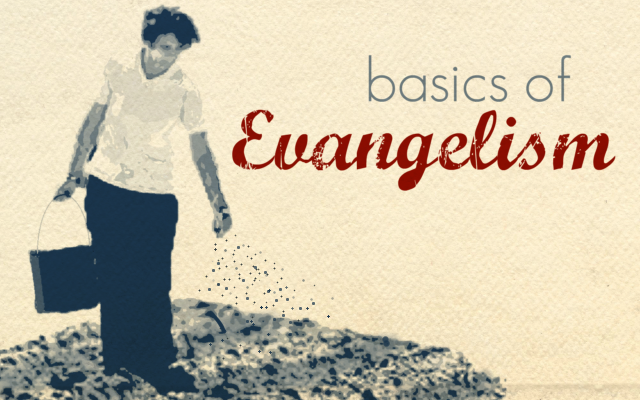
Basics of Evangelism
We retain some mixed feelings about evangelism, particularly on the how of it. And yes, we get discouraged because we don’t see much fruit – and so the temptation arises to quit speaking the gospel or to water down what we say…

By Clarence Bouwman
We’ve heard it all before – or so I thought. The recent Theological Conference hosted by the Canadian Reformed Theological Seminary turned out to be an eye-opener for me, particularly its treatment of evangelism. I thought I’d share with you the central points of the opening (and keynote) address. The speaker was Rev Henk Drost, minister of the Word of God in the Reformed Churches of the Netherlands, currently serving as missionary in the Ukraine. His first address to the Conference (he delivered two) was entitled Spreading the Seed of the Word: Reformed Foundations for Evangelism. From the get-go, it was abundantly obvious that this brother had thought the issues through, and done so with a very open Bible.
Sow
His principle thrust: you sow the seed, you do not cause growth. It was good to hear, simply because we commonly think that we fail to pass on the gospel if we don’t get the results we desire, and that in turn gets us discouraged and prompts us to give up. That’s not Scriptural thinking, we were told, because it’s God who causes the growth, not we. Once we’ve sown the seed we need to let go, need to give it over. That’s to say: being reformed (with respect to our neighbors and contacts) means that we spend time in prayer. Rev Drost challenged us to consider how we follow up on those conversations we’ve had with people around us; do we keep “knocking on their door” or do we multiply prayer for them? He was insistent: it is the latter we need to do.
It gave food for thought. Did I hear him aright? Doesn’t this let us off the hook – for it’s easier to talk to God about the neighbor than to talk to the neighbor about God, isn’t it?
Response
God speaks (through people) to the unbeliever. Since God Almighty speaks, the hearer is under obligation to respond. The temptation (we were reminded) is to play the hearer off against God with the argument that people are dead in sin and so can’t respond. When we stress human deadness (and hence inability to respond), we end up thinking that they need to hear the Word again and again – until the Lord awakens them to new life.
Scriptures, however, speak differently. God created people to be responsible, and so the church has rightly formulated the obligation of the (unbelieving) hearer like this: “the kingdom of heaven is closed when it is proclaimed and testified to all unbelievers and hypocrites that the wrath of God and eternal condemnation rest on them as long as they do not repent” (Lord’s Day 31.84). Those who pass on the good news of Jesus Christ to their neighbors must then, sooner or later, insist that the neighbor make a choice. The neighbor (though surely dead in sin) was created to respond to God, and so may not remain neutral to God’s call to repentance; he must embrace it in faith. If he fails to do that, he in effect has decided to discard the good news as rubbish. As to the actual moment when you press on your hearer the need to make a decision will depend on circumstances, including frequency of conversation, depth of discussion, gift of understanding, etc. When the person concerned effectively decides to reject the gospel, you do well to recognize that there are others who need the gospel….
Confessions?
According to Rev Drost, the trend in Europe is to separate reformed teaching from reformed evangelizing. (I might add: the same is surely true in North America.) The thought is that those who don’t know the gospel need baby food, and the reformed confessions are seen to be too complicated for that level. As a result, European evangelism has increasingly become characterized by un-Biblical thinking – and that in turn undermines what outreach work was actually intended to accomplish. Rev Drost was insistent: you must work with the reformed confessions, simply because they catch correctly the sound doctrine God has revealed.
That’s not to say, he continued, that one needs to throw all the deep things of the confessions at the hearer in the first meeting. On the contrary, you first relate the basics, and as understanding grows you dig deeper into the rich truths of Scripture.
But relating the basics is not the same as keeping it simple. It is not so, according to Rev Drost, that we need to bring the gospel down to Johnny’s level, as if his understanding it will prompt him to embrace it. On the contrary, it’s exactly when folk understand the gospel (Christ actually died to reconcile vile sinners to holy God) that some will reject it! Don’t, we were told, keep the gospel so simple that it’s not offensive. Speak the truth, and speak it plainly. Then leave the work of regeneration and faith to the Holy Spirit (see Canons of Dort, III/IV,11). This is ‘sowing the seed’.
Reformed?
What identifies evangelism as reformed (as opposed to, say, Pentecostal)? Rev Drost pointed to four “identity markers for reformed evangelism” (as he called them): Word, grace, choice and body.
Word
Evangelism theorists today stress the need to get to know your hearers. Though it’s certainly important to know the context of those to whom you speak, it’s far more important (Rev Drost stressed) that we know the Word of God well. To help any sinner in this postmodern world, we need not just reach the hearer, but need to reach him with the truth. Unless he hears the truth, he will not be convicted by the truth. The Holy Spirit, after all, uses the Word to work faith. This central importance of the Word is the core aspect of reformed evangelism. It is through knowing the Scriptures well that we are able to distinguish between what is Biblical teaching and practice on the one hand, and what is tradition on the other. We cannot insist on tradition; we must insist on what is Biblical.
Grace
Too often we experience that people get excited about the gospel – only to see them soon fall away. To prevent that tragic development, we need (we were told) to highlight from the start the need for grace, ie, the reality of sin and misery, and how the blood of Jesus Christ alone delivers us from the righteous judgment of God. The good news of justification of sinners lies at the heart of reformed evangelism.
To illustrate how important the point is, Rev Drost reminded us to so much evangelism today is done from perspective that “God loves you.” But, said Rev Drost, if I were an unbeliever in love with my sins, I’d say, “Thanks for that wonderful news; now leave me alone – for all is obviously well…!” Biblically faithful outreach work takes sin and ones fallen nature seriously. Every sinner is guilty before God, and therefore heading to judgment. Rev Drost was insistent: do not tell sinners that God loves them, for it’s just not true! Most people don’t know that their central problem is their sinfulness, and that God is the righteous Judge! So: confront them with the reality of their sinfulness and the reality of God’s judgment (and do it, of course, with love). Once you have done that, you are in a position to show them the solution, ie, God in mercy has given His Son to pay for sin. If you do not confront with people with their sin, they will not see the need to repent – and any perceived repentance will be superficial. Hence his plea: dare to speak of people’s identity as sinners and their need for a Savior from the righteous judgment of God.
Choice
The message of the Bible is strange to those around us. That the eternal Son of God died on the cross 2000 years ago outside Jerusalem to reconcile sinners to God is bizarre and foolish to the modern hearer. That being so, it is not fair to expect people to make a life-changing decision after they’ve heard scarcely 15 minutes of gospel preaching. One needs to keep on instructing the hearer in the revelation of Scripture. That instruction includes an appeal to the heart to make a conscious decision. After all, God is not mocked.
The more the hearer learns, the greater his responsibility becomes. As instructor, you come to the point (see above) where you put more pressure on the hearer to give a response to God. If that person refuses to respond positively, cease evangelizing that person – for time has value and there are others who need to hear the word.
Body
In Scripture, a positive response to Christ is at the same time a response to His body, the church. The church, though, is frowned upon today. Is it actually important to call a new believer to the body of Christ? Isn’t joining the local church with its geographical boundaries an outdated concept?
The Bible makes no distinction between joining Christ and joining His body. Jesus spoke of taking up His yoke and learning from Him – and that happens through the teaching given in the local church (see Art 28 Belgic Confession). It is in church that the new Christian finds rest for his soul. To do evangelism without directing the person to the church is Biblically incorrect; the new convert desperately needs the fellowship of the church.
This means in turn that the church needs to be prepared to receive those in whom the Holy Spirit works faith. The church needs to exhibit love, devotion and nurture for these newcomers. This is what happened in the Pentecost church of Acts 2, and it needs to continue to happen in every church that calls itself by the name of the Lord. In fact, if one dares to pray that God almighty work repentance and faith in the neighbor, one needs to accompany that prayer with establishing mechanisms to receive those whom God (through our conversations) is pleased to bring to faith. After all, one counts on God answering prayer….
In Sum
We retain some mixed feelings about evangelism, particularly on the how of it. And yes, we get discouraged because we don’t see much fruit – and so the temptation arises to quit speaking the gospel or to water down what we say. This lecture provided a necessary corrective to that temptation. Evangelism is nothing more (or less) than sowing – and once you’ve sown the seed you –prayerfully- let go.
You can hear the lecture here: http://www.canadianreformedseminary.ca/general/2012_conference.html

1 thought on “Basics of Evangelism”
Comments are closed.